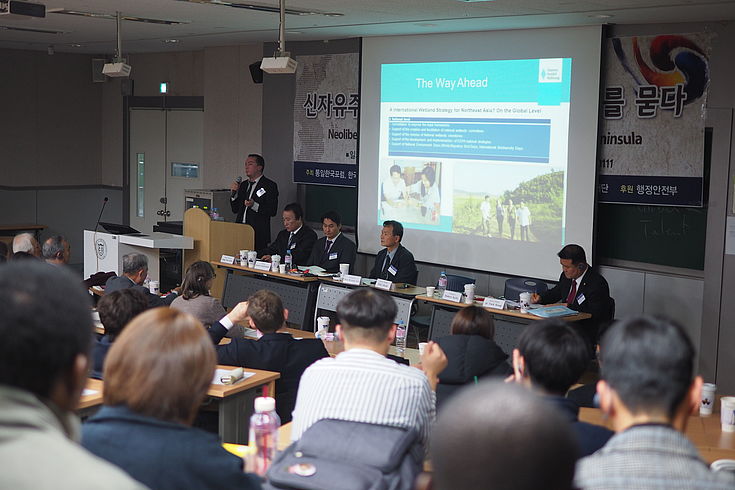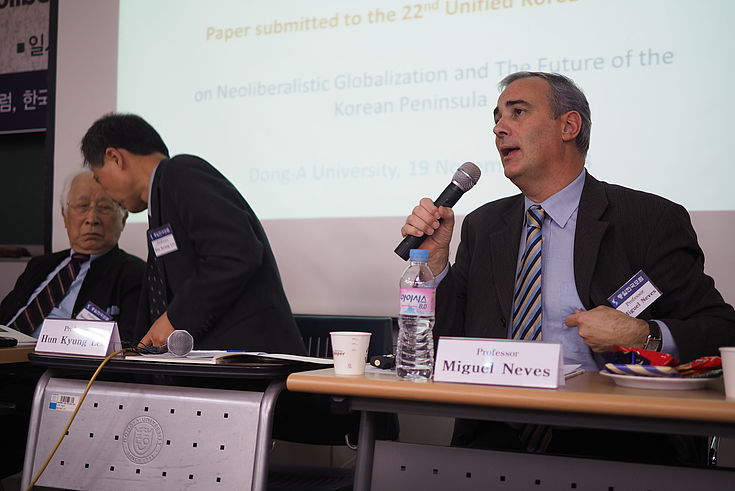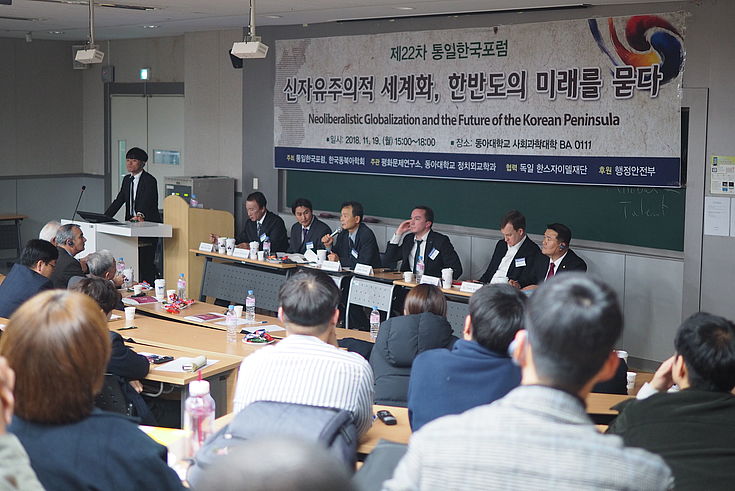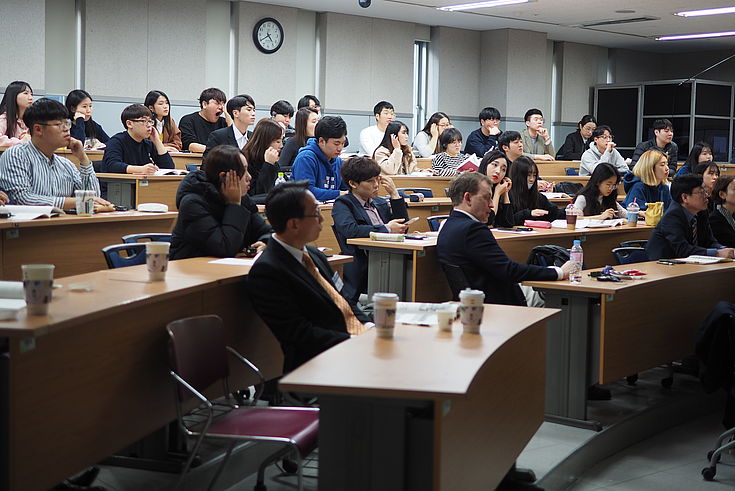Tongil Hankuk Forum
Neoliberal Globalization and the Future of the Korean Peninsula
Felix Glenk while holding his welcoming address at the Dong-A University in Busan
HSS
The event was opened by Hyung Soo Kim, the president of the Korean Association of Northeast Asian Studies who emphasized that inner-Korean relations should be an interwoven web consisting out of many different actors, including scientific institutions and civil society, instead of bilateral relations which may be more effective but at the same more fragile. He expressed his gratitude to the Hanns Seidel Foundation for its efforts in establishing contact between the two Koreas on many different levels. Felix Glenk, Project Manager for DPR Korea of the HSF, gave the welcoming address. In his speech he emphasized the changes taking place in South Korea over the past 30 years in which HSF is active in the country and the need for close cooperation with trusted partners on the Korean Peninsula. This long-term engagement also shows that while politics follows its own rigid path, actors on other levels can establish and keep relations nevertheless. HSF represents dialogue and exchange in South Korea, on the Korean Peninsula and in Northeast Asia.
Presentation by Prof. Neves on neo-liberal adjustment policies as impediments to long-term growth equality and social cohesion
HSS
The first session included a presentation by Prof. Miguel Santos Neves from Autonoma University Lisbon. He gave the perspective on the situation in Portugal regarding neo-liberal adjustment policies as impediments to long-term growth, equality and social cohesion. The second presentation hold by Prof. Park Sung-Jo focused on the widening global knowledge gap through multinational corporation’s research and developmental investments. The discussants were the following: Prof. Changgeun Kim from Busan National University of Education, Edward K. Rim from the Pacific Rim Cultural Foundation and Prof. Heike Hermanns from Gyeongsang National University. Prof. Hermanns reminded the audience that basically “since the IMF crisis, Korea needs to open up”. This concluded how global crisis can have an impact on national politics.
Second session of the conference on Neoliberal Globalization and the Future of the Korean Peninsula
HSS
The second session with the title “Globalization Era, North Korean Experience and Lesson, Environmental diplomacy and International Cooperation with the North” included one presentation by Felix Glenk, the Project Manager for DPR Korea at HSF Korea. In his presentation on the Hanns Seidel Foundation and environment diplomacy, he presents lessons, which were learned from 15 years of work in North Korea, as well as introduced the foundation’s work on the Korean Peninsula and how environment can serve as a platform for cooperation in the region. Multilateral exchanges, e.g. through frameworks such as the UN Ramsar Convention on Wetlands, can bring together representatives of politically hostile countries to address global environmental challenges, thus, initiating a process to build trust among these partners. Many questions followed by Dr. Ju Taek Kang from the Institute for Peaceful Northeast Asia and Unified Korea, Prof. Robert E. Kelly from Busan National University, Prof. Sang Yoo Park of Qingdao University and Dr. Bazarjav Jargalsaikhan from the Mongolian Consulate in Busan. Dr. Ju addressed the question how South and North Korea could engage, which lead to the conclusion pointing to the support of South Korean multilateral institutions to integrate and engage with North Korea. Prof. Park emphasized the problem of implemented sanctions preventing some cooperation although it was questioned if this occurs due to the prohibition through sanctions or rather the fear of violating the sanctions. Prof. Robert Kelly brought up the ever-existing dispute if humanitarian aid is a factual substitution of the North Korean state, as well as the importance to address the symptoms and not the causes for the environmental degradation in North Korea. Eventually, the Mongolian Consul in Busan, Dr. Jargalsaikhan, pointed out that if North Korea’s economy develops, it almost certainly will have also negative impacts on the environment as the experiences in Mongolia have proven.
A lot of interested students participated in the conference
HSS
The event provided the opportunity to discuss the impact of globalization regarding the current inner-Korean rapprochement with a focus on environmental challenges on the Korean Peninsula among representatives of different institutions with partially highly contrasting perspectives. HSF Korea together with long-term partners, such as the Institute for Peace Affairs and the Dong-A University in Busan, will continue to promote the dialogue and exchange beyond borders in Korea and Northeast Asia.




